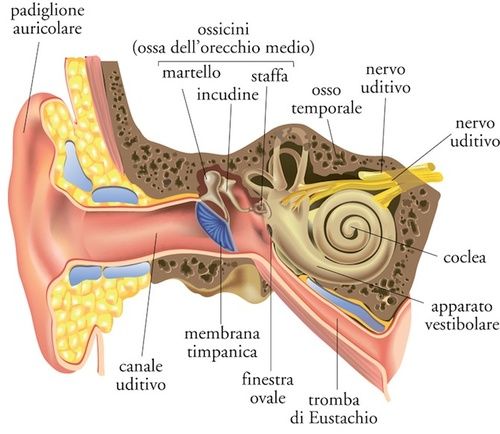Vertigo: symptoms, causes, all remedies
Dizziness is a manifestation of acrophobia. It is not just about being afraid of heights, but about developing an anxiety that involves muscles, balance, heart, sweating .
The most frequent cause depends on pathologies affecting the ear labyrinth . Let’s find out better.
> Symptoms of vertigo
> Causes
> Diagnosis
> Treatments for vertigo
Internal structure of the ear

The causes of dizziness can be different. They can be symptoms of specific pathologies; the most frequent are those affecting the ear labyrinth (the organ of balance) such as labyrinthitis and Ménière’s syndrome.
Other triggering causes of the disorder are cerebrovascular diseases such as atherosclerosis, pressure disorders , inflammation of the inner ear, infections of the nasal or laryngeal mucosa, cervical disorders , migraines , epilepsy.
Symptoms of vertigo
Vertigo can give a sensation of auricular fullness, momentary deafness, which is associated with the sensation of rotation of the surrounding environment ( objective vertigo ) or of the subject’s rotation with respect to the environment ( subjective vertigo ). There may be a feeling of suffocation, increased sweating, tachycardia .
Causes
It is always good to get to the bottom of the causes that can generate dizziness. Among these we list:
- Mèniére’s disease (increased fluid inside the ear in the area called the labyrinth);
- Labyrintholiasis (formation of small stones in the labyrinth);
- Vestibular neuronitis (sudden unilateral reduction of a vestibular nerve);
To these are added causes that may relate to a certain moment of life that one is experiencing and that generates particular muscular tensions, recurrent migraines , cardiocirculatory disorders.
We often speak of ” cervical vertigo ” , as the symptoms are often related to cervical lesions. In 1955 by Ryan and Cope introduced this term and it became, after cupulolithiasis, one of the most common causes of vertigo.
Diagnosis
The diagnosis usually passes through the cochleo-vestibular examination through which the balance and the auditory function are analyzed.
The diagnostic examination also includes the identification of vertigo as a symptomatology that differs greatly from dizziness .
In the second case, in fact, we are dealing with a metabolic or cardiac disorder , while dizziness originates in problems of the otologist or neurological .
TREATMENTS FOR VERTIGOS
Diet
Often, in the case of a diagnosis of labyrinthitis with vertigo , the ENT may suggest a low- sodium diet. In general, we are with Valdo Vaccaro when, in response to one of the very useful letters he receives every day, he affirms that “salvation comes from the vitality of thought, air, sun and food”. Specifically, the letter addressed to him concerned labyrinthitis and dizziness in relation to diet; we advise you to read it, because it is a nice personal reportage on the direct events of a person suffering from vertigo and passed through ENT, endocrinologists, etc.
In particular, Vaccaro goes back to highlighting how anxiety, stress and dizziness are the source and result of great weakening caused by food poisoning first of all.
We advise you to let go of cookies and coffee in the morning and replace with watery fruit. Limit exciting drinks, alcohol.
Fruits between meals (all fruits without exception). Raw vegetables to start the meal , be it winter radicchio, lettuce, red and black radishes, spicy turnips, carrots, raw artichoke, raw fennel, raw cabbage. To pasta or white rice, prefer buckwheat, millet, quinoa, brown rice .
All to be served with cooked vegetables of the finest qualities and varieties, given how rich we are in these precious gifts of nature: rocket, dandelion, sorrel , fennel, mint, artichoke, mallow, nettle, burdock, plantain, purslane, root phytolacca.
You can learn more about all the properties and benefits of cereals

Herbal remedies for vertigo
In case of dizziness linked to particular emotional states or accumulation of stress that negatively affects the quality of life, plants with a calming and antidepressant action are needed . Such as lemon balm , which gives great support to the nervous system .
Lavender is a nerve calming and antispasmodic that is widely used in the cause of dizziness, migraines and nerve pains in the head.
In the case of vertigo with origin linked to the compression of the vertebral area, plants with a vasodilating effect come to the aid. Yes to hawthorn , nettle , horse chestnut .
Periwinkle is the quintessential healing herb in treating vertigo.
Aromatherapy
The essential oil of lemon balm combined with that of cypress and horsetail powder , in capsules, can be useful in counteracting the onset of psychogenic dizziness.
Lavender essential oil is also excellent for psychogenic dizziness.
Bach flowers for dizziness
Among the Bach flowers it is very suitable:
- Rock Rose when dizziness is associated with tachycardia, chest constipation, anxiety and stress accumulated unknowingly;
- Scleranthus is the useful remedy to regain inner balance.
If there is a strong attack of dizziness associated with panic, it is better to resort to Rescue Remedy .
Traditional Chinese Medicine
Energy decompensation is the basis of dizziness for Chinese medicine . If in mild form, acupuncture works on kidney and spleen function , organs related to the water system of the human body.
If, on the other hand, there are severe episodes of dizziness associated with other symptoms (tachycardia, panic attack, etc.), we go to work on the retention of mucosity in the abdominal region or on disorders of the functional activity of the liver .
In addition to acupuncture, also with Chinese herbal medicine and Tui na massage you can move the energy a lot and bring it back to its natural flow.
Homeopathy
After the homeopath’s interpretation of the explanation of symptoms and observation of the patient, homeopathic remedies for vertigo usually are:
- Gelsemium 5 CH: vertigo starting in the occiput and radiating to the head and eyelids; the subject has the sensation of falling and losing balance, especially with the eyes closed. Dizziness from performance anxiety with panic attacks with tremor, paralysis, great weakness.
- Argentum nitricum 5 CH: vertigo associated with phobias in an anxious, hasty, stressed individual , hypochondriac with anticipatory anxiety, disturbances in motor coordination, asthenia, emotional diarrhea . Dizziness worsens when looking from the bottom up and looking at tall buildings.
- Vertigo associated with emptiness by which the subject is attracted and frightened at the same time.
- Bryonia 5 CH: Movement-associated vertigo that occurs in the morning. Violent dizziness that makes you bed accompanied by nausea, pains in the neck and head. The subject is irritable and short-tempered, dizziness is often triggered by anger and digestive disturbances.
- Cocculus 5 CH: used in dizziness associated with movement as in the case of transport sickness (for example: car sickness ); in these cases it is useful to take the granules just before departure and as needed.
- The remedy is useful for violent dizziness triggered by vestibular seizures that worsen by sitting down, looking around or observing moving objects. Crises triggered by prolonged night watches.
- Aconitum napellus 5 CH: dizziness that appears following fright, agitation, anger, hypertensive crisis. Remedy used in all acute states in subjects with anxiety neurosis and panic attacks .
- Borax 5 CH: altitude phobia dizziness associated with leaning forward or with the movement you make to descend from a high point.
If there is diarrhea, nausea, vomiting, headache, recurrent canker sores, herpes , extreme sensitivity to noise.
- Conium 5 CH: dizziness that worsens when lying down or moving with a sensation of rotation of objects and the surrounding space with photophobia and tearing.
- Lively person who is afraid of being alone but fears the company of people he does not know. It is very sensitive to physical efforts and psychophysical fatigue. A key to the remedy is improvement when the patient lets the legs hang down.
- Alumina 5 CH: remedy indicated in sensorineural disorders with sensation of vertigo, weakening of vision, mental confusion. Subject with hasty behavior but with a paradoxical slowness in movements; he is confused, indecisive and very emotional.
Exercises and movement in case of dizziness
If you suffer from it, always start with the breath , it is the key to start changing. The osteopath can perform, after cervical evaluation and having any neurological exams in hand, repositioning or liberating maneuvers.
It is good to rely on someone really experienced, who may also have knowledge in the field of cranio-sacral therapy . It works on the cerebrospinal fluid and on the “breath” between the flat bones of the skull.
Dizziness can be a good message that our body sends us to achieve a breathing that is deeper, more diaphragmatic and abdominal.
Stay in the sun whenever you can, have patience with your own life, ventilate the room even at night if possible. Green light to the yogic work on pranayama .




























+ There are no comments
Add yours